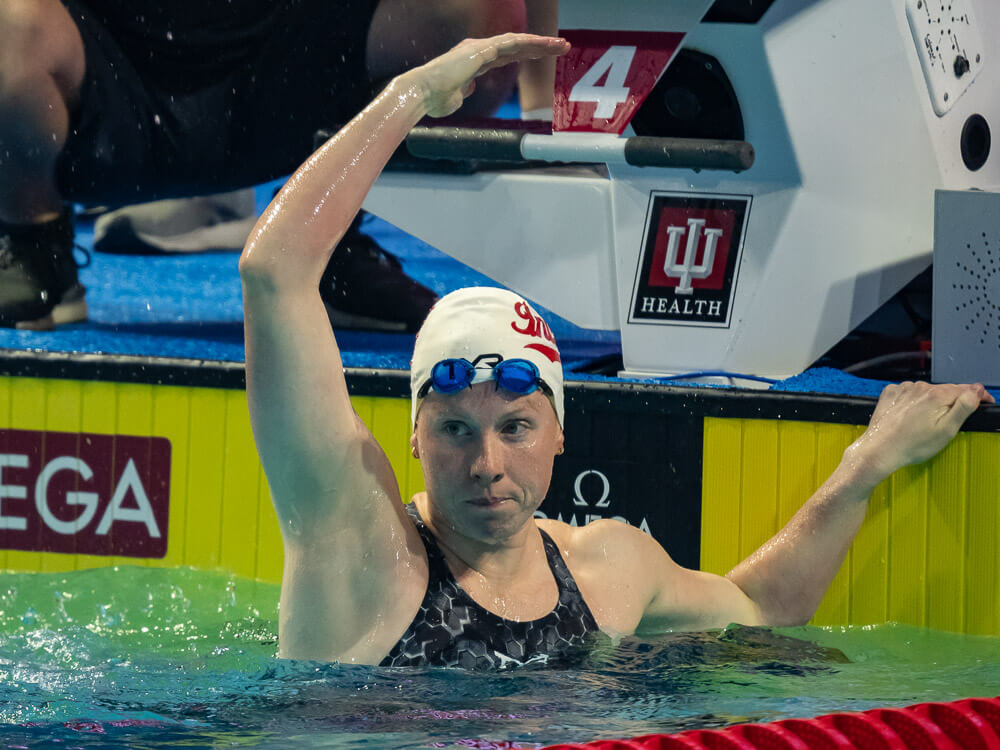The Untold Truths about Swimming: What Some May Not Know

The Untold Truths about Swimming: What Some May Not Know
By Evangelia Vasilakis, Swimming World College Intern
Like anything, swimming has its share of untold truths that not everyone outside of the sport is aware of. There are many truths that we choose to talk about in the swimming world and the truths we love to acknowledge. These are the things that keep us going, or that break us down. These are crucial to understand the sport and the athletes that participate in the sport.
The Lack of Sleep
Many collegiate athletes in the sport of swimming know this. In college, and with many high school teams, there are morning practices. But as any student knows, they have piles of homework, a social life, and jobs all on top of many hours of practice. All this can add up and cause a lack of sleep, especially if you have morning practices.
Dry Skin
Swimmers will almost always suffer from dry skin. The chlorine is terrible for the skin, causing it to dry out. I feel like no matter how much lotion I put on my skin, it will never feel better. Dry skin is something that swimmers have to deal with every day.
Messy Hair
Any swimmer knows that chlorine also dries out your hair. Swimmers always deal with damaged hair from the caps to the chlorine. Female swimmers haphazardly throw their hair up in messy buns, and walk around with a wet head. The men typically just let it dry in any old position because they know it’s not worth fighting it after practice. Our hair takes so much damage after many seasons of swimming.
Constant Hunger
Swimmers know the frustration of always being hungry. They burn so many calories while in the pool they have to constantly eat. I know most of my money goes to buying food and snacks throughout the day. We find it so important to eat so we can preform well at meets and in practice. We love our food and often joke about the swimmers’ diet of eating everything!
Muscles Are Always Sore
A swimmer will almost always feel sore because of the rigorous practices they do every day. Swimmers do not only work in the water but they often lift, too. Their muscles are under strain almost every day, without a break. Swimmers complain about soreness, but they continue to swim because in the end, that soreness is worth the achievement of their goals.
Best Times Don’t Always Come
Swimmers know that when racing, you often find yourself upset with your race. Not every race is a personal best. Swimmers often plateau and do not log a personal best for some time.
Team Dynamics Are…Interesting
More often than not, a swim team can be very close. This can be seen when teammates hang out and enjoy time together. But this is not always the case. You do not always have to be happy on your team. This can be corrected by finding a team that you fit well on. But if that is not possible, swimming is an individual sport and you can push yourself without the support of your teammates.
The Sport Provides Memories
After all the time and dedication given to the sport, your biggest untold truth is that many of your best memories involve the sport. It can be the first ribbon you won in age-group race. Or, all the pasta parties you attended. It can be goofing around on deck with your teammates. Or, it might be the memory of accomplishing your goals. Swimming provides any long-term athlete with many fond memories.
Overall, there are numerous untold truths of swimming. We have so many things that we acknowledge or ignore. While many are positive, some are negative too. As swimmers, we need to embrace many of these to be successful.
All commentaries are the opinion of the author and do not necessarily reflect the views of Swimming World Magazine nor its staff.




Thanks. This is spot on, but I might add a few more. It’s hard to breathe at most meets. It will make your family go broke. It is only for TYPE A personalities. It negatively affects everything else in your life. It’s bad for your teeth. The only people in the crowd your entire career are parents. Nobody else outside of swimming understands what you do, leaving you feeling on the outside of society and alone. You are left with a friend group of only swimmers because no one else’s live can fit within the singular focus required of a swimmer. You will need to leave fun social activities way before non-swimmers in order to tamp down the anxiety/pressure that constant early practice/lack of sleep hold on you. You will have very few other experiences other than swimming. You will be forced to accept the scientifically proven damage that lack of sleep does to a teen’s development. You will be forced to “train” like a professional at a very young age. When you are done swimming, you will have no idea who you are or what you should do.
Oh, and it helps with your organizational skills.
Sorry you had a negative experience. I don’t disagree with any of your points. However there are positive things people take away from the sport.
The first four “untold truths” are very true but we swimmers today can be thankful that the old number one on the list has been eliminated. If you swam before the mid 1960’s you remember eyelids that felt like sandpaper and seeing the world through a rosy blur. The greatest improvement in swim technology is not lane lines or pool gutters—-the swim goggle revolutionized swimming, made more yardage possible and advanced swim performance more than any tech suit ever did.